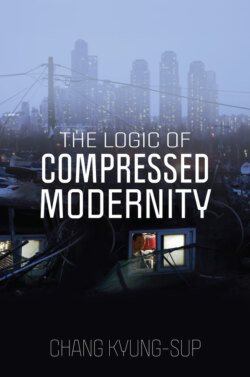Читать книгу The Logic of Compressed Modernity - Chang Kyung-Sup - Страница 15
NOTES
Оглавление1 1. In this regard, David Harvey’s (1980) observation on the (global) time–space compression under the accumulation crisis of late modern capitalism should be differentiated from the national, regional, organizational, familial, and personal condensation of time and space under postcolonial compressed modernity.
2 2. See Ernst Bloch ([1935]1991), Heritage of Our Times. As Germany was behind England and France in industrialization, and in modernization in general, Bloch perceived the German social situation as wedged between backward culture and modern industrialism.
3 3. See Kim, J. (2019) for a lucid account of Korean traditional medicine’s arduous struggle in the contemporary health sector under the hegemonic dominance of Western medicine.
4 4. “Too dynamic” once became a thematic phrase for South Korea among many foreign media correspondents in Seoul during the Roh Moo-Hyun presidency. “Dynamic Korea” was an official catchphrase for attracting international tourism to the country, but these foreign journalists seem to have felt that it was too dynamic.
5 5. Giddens (1990: 18–19) argues, perhaps inspired by Walter Benjamin’s critical assessment of modern cities (Gilloch 1997), “In conditions of modernity, place becomes increasingly phantasmagoric: that is to say, locales are thoroughly penetrated by and shaped in terms of social influences quite distant from them.”
6 6. Interestingly, this familial(istic) nature of South Korean modernity seems to have been more persuasively revealed and more effectively communicated in Korean cultural products (that is, dramas, cinemas, and novels that address family relationships and affairs thematically) than in academic social sciences (whose Western dependency chronically inhibits autonomous systematic exploration of the local essential features of social issues and phenomena). See Kim, Y. (2013) for Korean dramas in this regard.
7 7. See Orta (1999) for an ethnographic discussion of complex personhood. See Abelmann (2003) for a discussion on the South Korean case.
8 8. Internal multiple (compressed) modernities can be seen as complex local instances of Appadurai’s (1990) global “scapes” in postcolonial modernization.
9 9. See Dirlik (2003, 2004) on “global modernity,” and Pieterse (1994) on “globalization as hybridization.”
10 10. In this respect, “provincializing Europe” (Chakrabarty 2000) is a necessary, but not sufficient strategy for analyzing postcoloniality or postcolonial modernity/modernization.
11 11. Bruno Latour’s (1993, 2005) view on social (dis)order in his “practical metaphysics” may have some epistemological affinity with this proposition.
12 12. If we consider widespread and even endemic manifestations of unintendend and/or unknown consequences in such modernitizations, John Urry’s (2003) thesis on “global complexity” can be usefully applied here.
